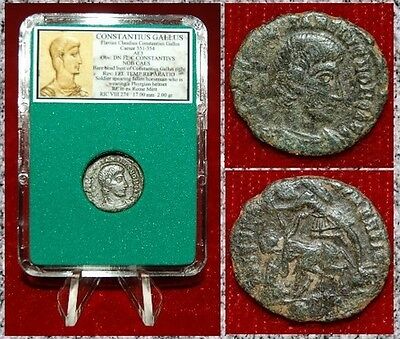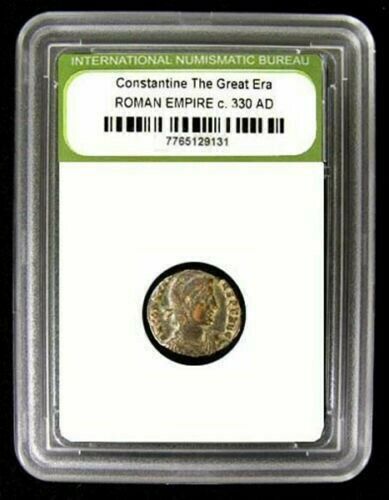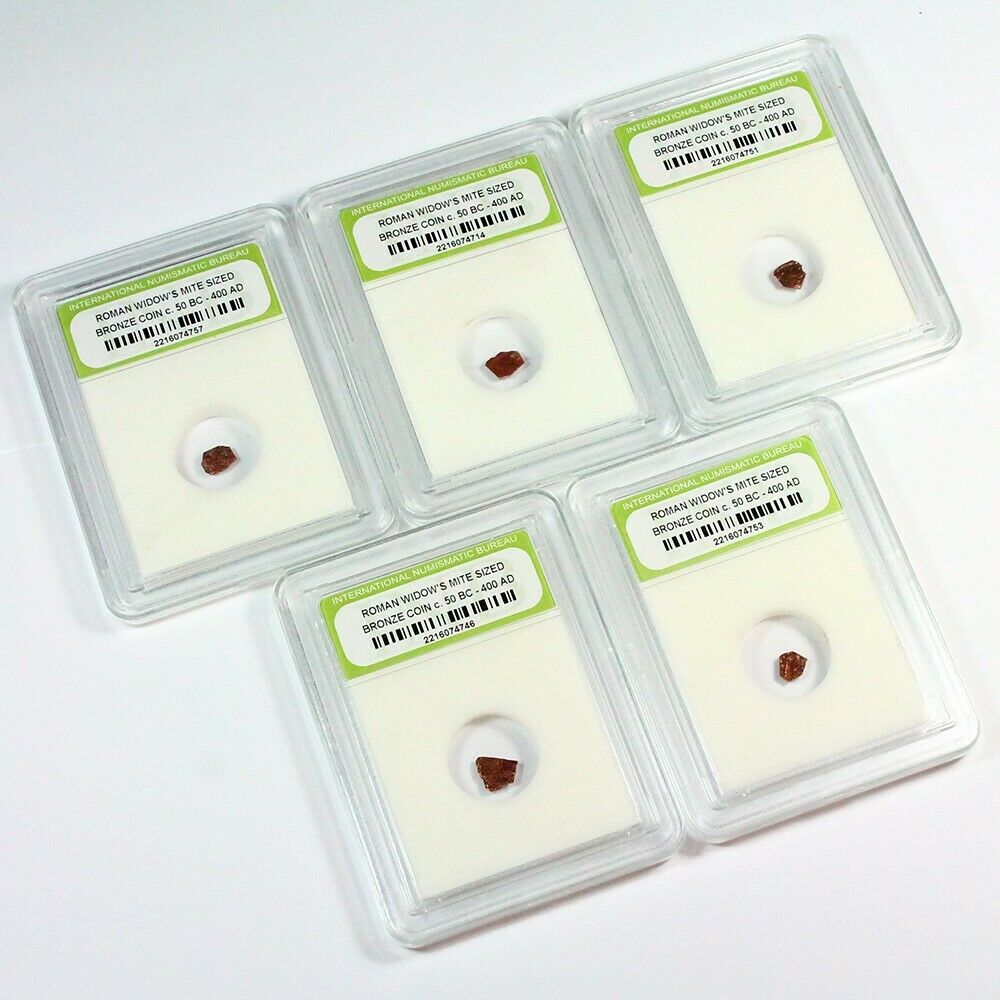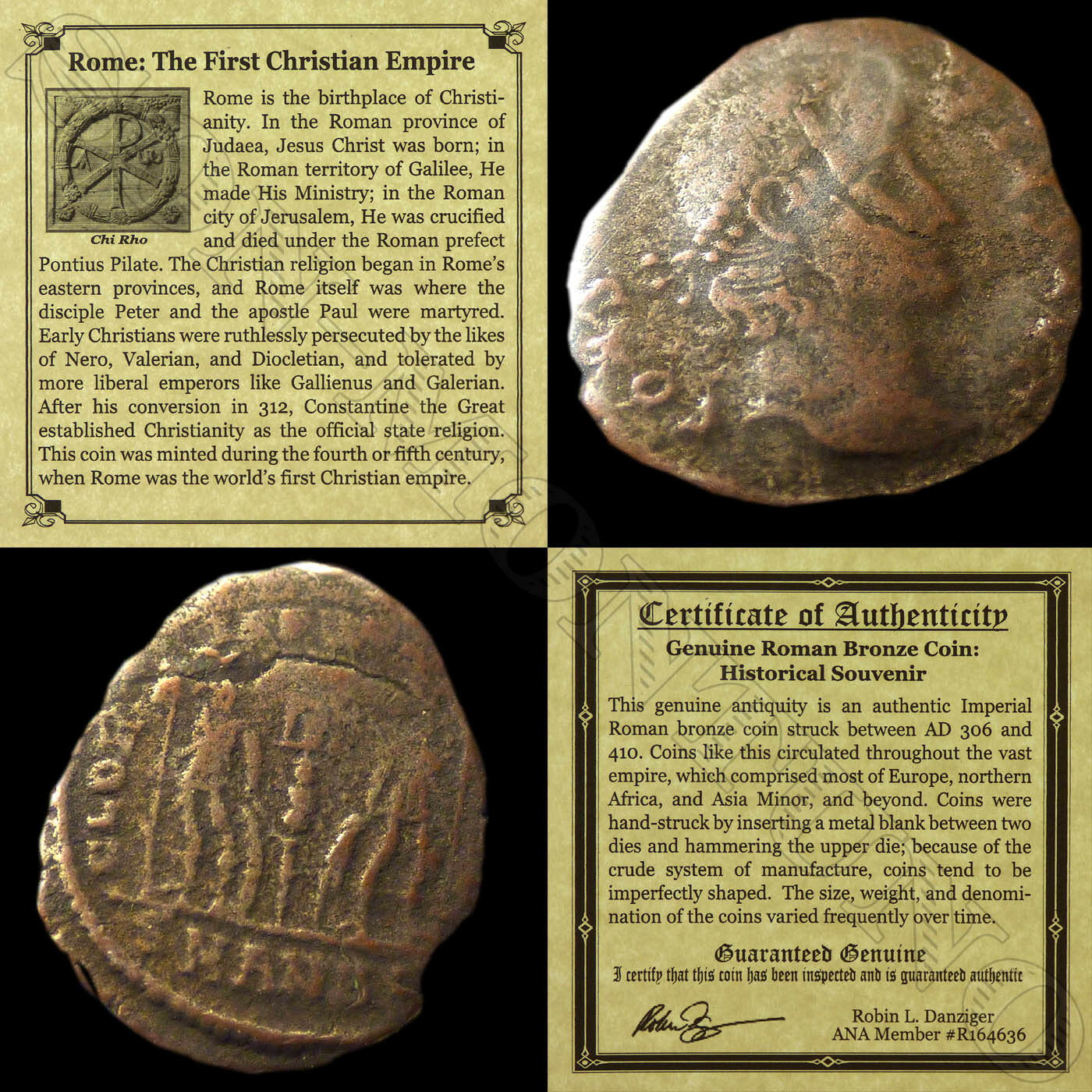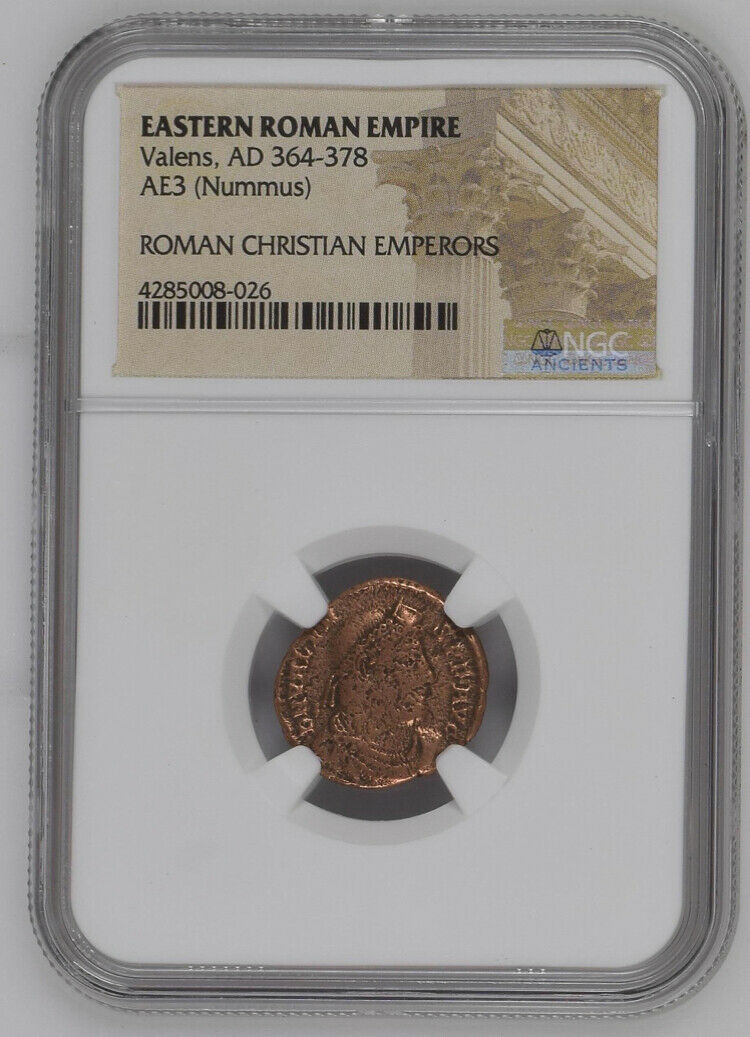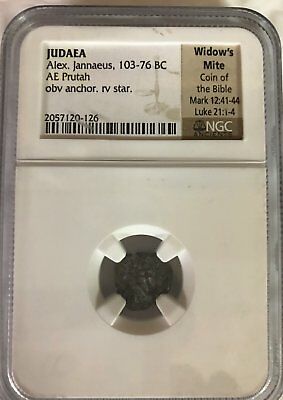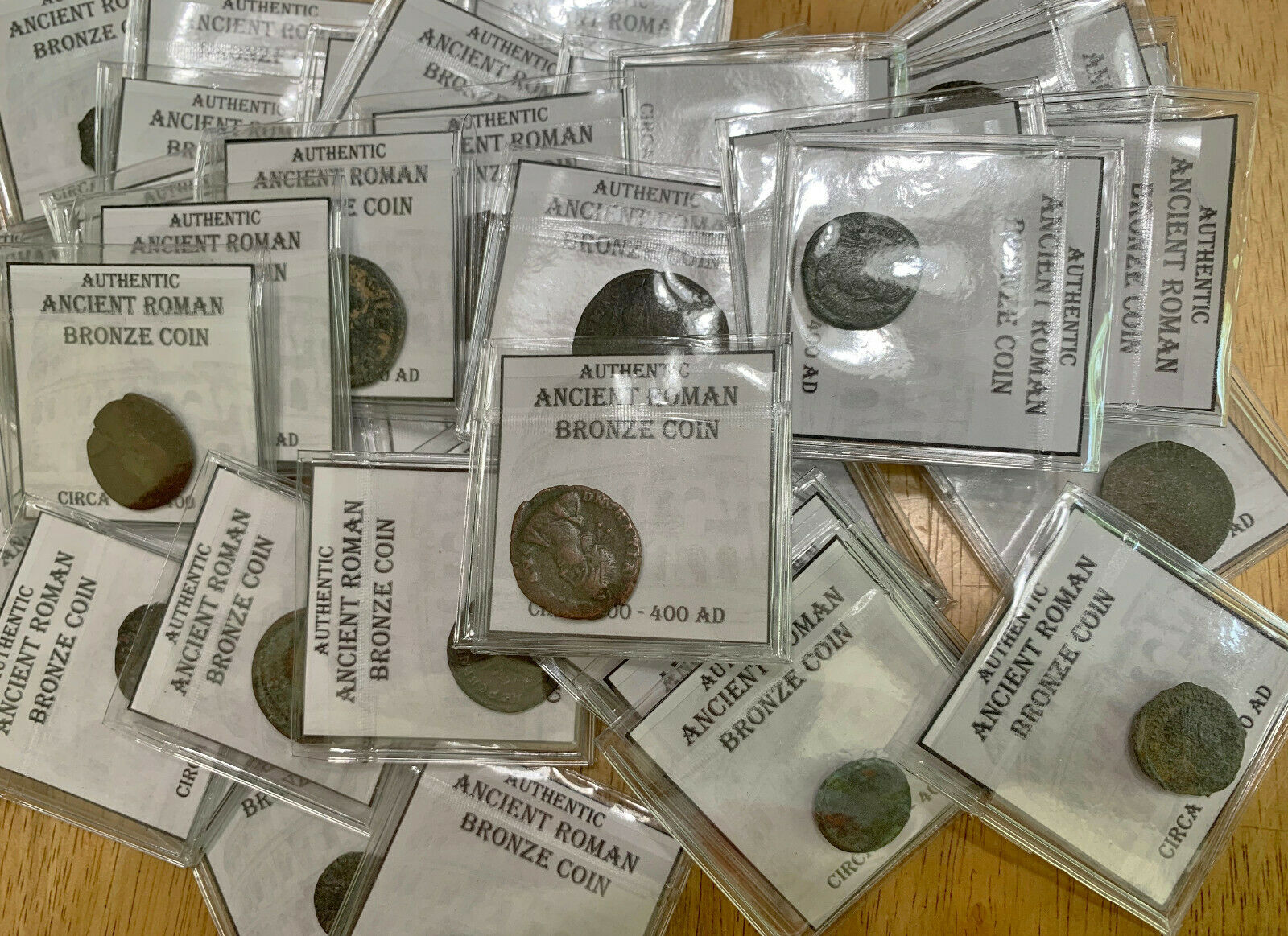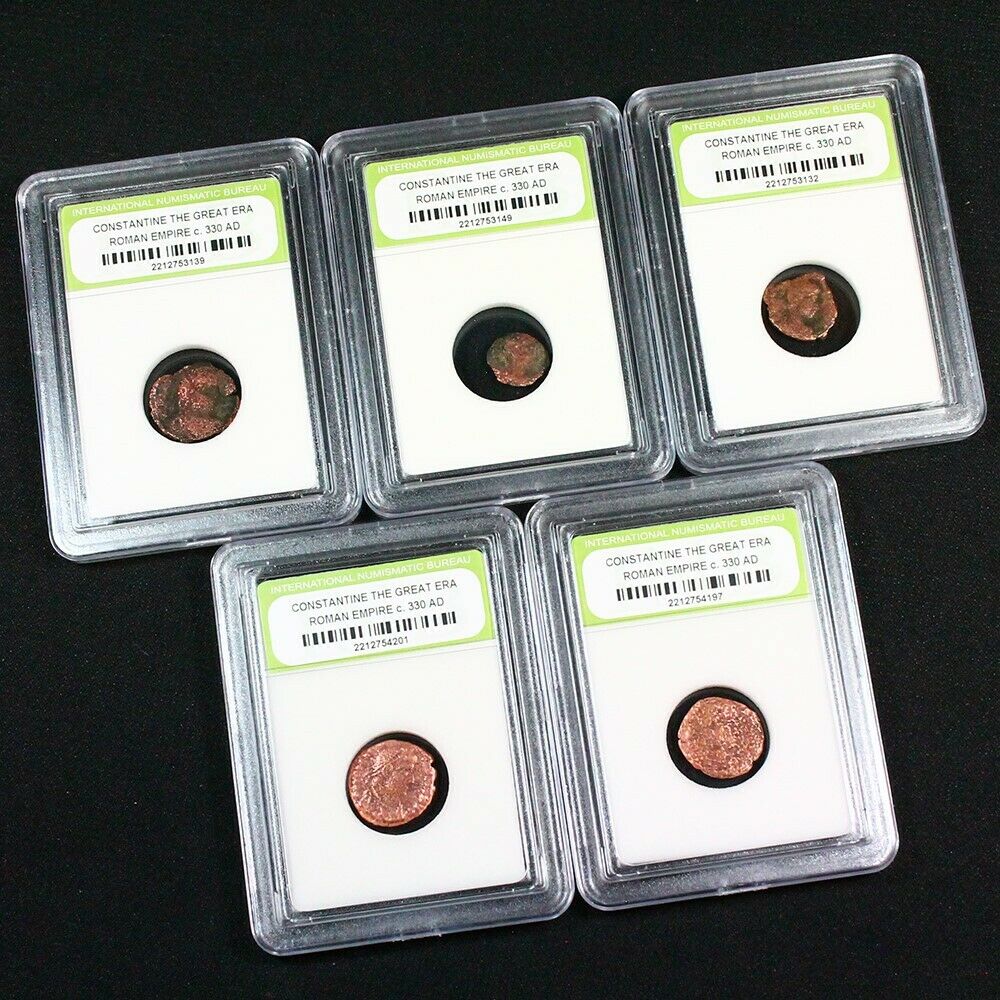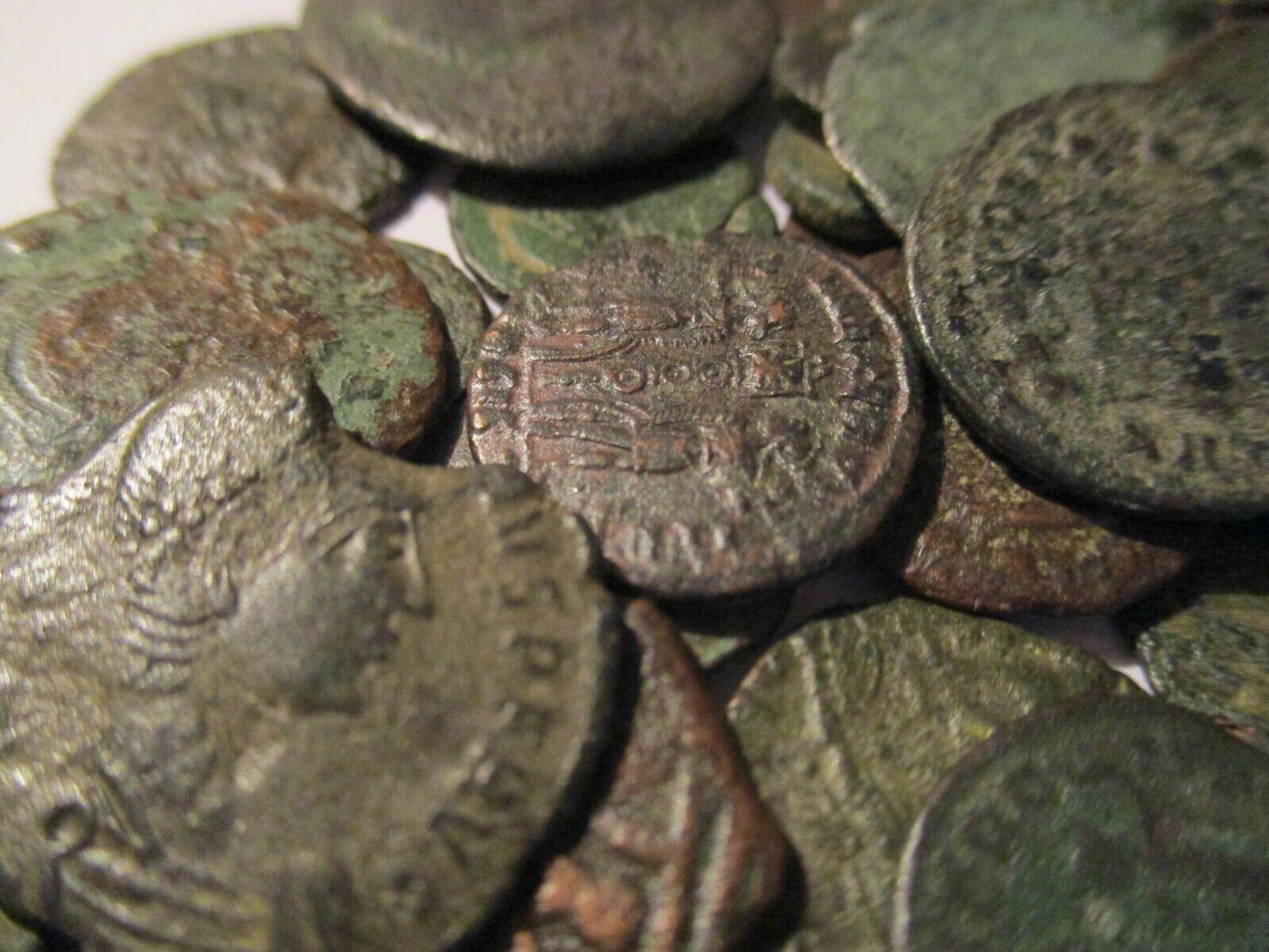-40%
Ancient Roman Empire Coin Of CONSTANTIUS GALLUS Soldier Spearing Fallen Horseman
$ 22.17
- Description
- Size Guide
Description


Click to view supersized image
ROMAN EMPIRE
Ancient Coin
AE3
Of
CONSTANTIUS GALLUS
Flavius Claudius Constantius Gallus
Roman Caesar: 251-254 AD
Obv: DN FL C CONSTANTIVS NOB CAES
Bare-headed bust of Constantius Gallus right
Rev: FEL TEMP REPARATIO
"Re-establishment of happy times"
Roman soldier spearing fallen horseman
17.00 mm
PRIVATE
ANCIENT COINS COLLECTION
SOUTH FLORIDA ESTATE SALE
( Please, check out other ancient coins we have available for sale. We are offering 1000+ ancient coins collection)
ALL COINS ARE GENUINE
LIFETIME GUARANTEE
AND PROFESSIONALLY ATTRIBUTED
The attribution label is printed on archival museum quality paper
An interesting coin of Constantius Gallus with Roman soldier spearing fallen horseman on reverse.
This coin comes with display case, stand and attribution label attached as pictured
. A great way to display an ancient coins collection! You are welcome to ask any questions prior buying or bidding. We can ship it anywhere within continental U.S. for a flat rate of 6.90$. It includes shipping, delivery confirmation and packaging material.
Limited Time Offer:
FREE SHIPPING
(only within the continental U.S.)
The residents of HI/AK/U.S. Territories and International bidders/buyers must contact us for the shipping quote before bidding/buying
Constantius Gallus
Flavius Claudius Constantius Gallus (ca. 325/326–354), commonly known as Constantius Gallus, was a member of the Constantinian dynasty and Caesar of the Roman Empire (351–354). Gallus was consul three years, from 352 to 354.
Gallus was a son of Julius Constantius by his first wife Galla. Gallus' paternal grandparents were the Western Roman Emperor Constantius Chlorus and his second wife Flavia Maximiana Theodora. Julius Constantius was a paternal half-brother of the Roman Emperor Constantine I, which, in turn, meant Gallus was a half-first cousin of Constantine's sons, Constantine II, Constantius II and Constans. At some point prior to 331/2, Gallus' mother, Galla, seems to have died, as at that stage, Gallus' father was married to one Basilina and had had a son by that marriage.
Gallus had three siblings: an elder sister, of unknown name, who was the first wife of Constantius II, an elder brother, also of unknown name, who died in the purges after the death of Constantine I, and a younger half-brother by his father's second marriage, named Flavius Claudius Iulianus, commonly known as Julian.
Gallus was born in Massa Veternensis, Italia, after his father had been recalled from exile. Gallus' father and his elder brother were amongst those killed during the purges that occurred in the imperial family after the death of Constantine I in 337. Gallus himself was one of the only imperial males, outside of the three sons of Constantine I and Fausta, who were not killed; the others being Gallus' younger half-brother, Julian, and their cousin, Nepotian, each of whom was very young at the time.
There is debate over where Gallus spent his youth. One view is that he lived with Julian in Nicomedia under the care of Eusebius, who was the bishop of Nicomedia until 340. At which point, Eusebius was made bishop of Constantinople, which necessitated Gallus and Julian to follow him to that city. It is believed that after the death of Eusebius in 341, Constantius then sent Gallus and Julian to continue their studies at the imperial household in Macellum, Cappadocia. An alternative view claims that hints in the sources suggest that Gallus was sent to Ephesus to study, then to a type of exile in Tralles and from there to the imperial household in Macellum.
In 350, Magnentius had rebelled and killed the emperor Constans, claiming the purple. Constantius II prepared to move against the usurper, but needed a representative in the East, so he called Gallus at Sirmium, raised him to the rank of caesar (15 March 351), gave him the name Constantius, and strengthened the bonds with his cousin by allowing Gallus to marry his sister Constantina. Gallus and Constantina, who probably shared her brother's aim of controlling the young Caesar, set up residence in Antioch.
During his rule, Gallus had to deal with a Jewish rebellion in Judea/Palestine (see Jewish revolt against Gallus). The rebellion, possibly started before Gallus' elevation to Caesar, was crushed by Gallus' general, Ursicinus, who ordered all the rebels slain.
Gallus was saved from an assassination plot by a woman, who revealed that some members of her household were planning the murder. Some sources, among whom are Joannes Zonaras, claim that this plot had been organized by Magnentius in order to distract Constantius from Magnentius himself.
Some sources (Philostorgius) claim Gallus' generals won a campaign against the Sassanids. Others, basing their views on an almost-peaceful situation between Sassanids and Romans, dismiss this claim. In 354, Gallus sent the comes Orientis, Nebridius, against the Isaurians, who had been raiding the city of Seleucia on the Tigris.
As a consequence of the need to gather food for the troops of a Persian campaign or because of drought, the grain supply in Antioch decreased. In order to counter the higher price of grain, Gallus forced the passage of some laws regardless of the opinion of the Senate, thus alienating the support of the senatorial class of Antioch. Ammianus Marcellinus, a philo-senatorial writer, tells how the anger of the people of Antioch for the famine was diverted by Gallus towards the consularis Syriae Theophilus, who was killed by the mob.
Ammianus reports also that Gallus and Constantina started several trials for magic against wealthy people, ending in the execution of innocents and in the confiscation of their wealth. The same source claims that Gallus walked anonymously in Antioch by night, asking passersby for their opinion on their caesar, while Julian records the great amount of time spent by Gallus at the Hippodrome, probably to obtain popular support.
Doubting his cousin's loyalty, Constantius reduced the troops under Gallus, and sent the Praetorian Prefect Domitianus to Antioch to urge Gallus to go to Italy. Different sources tell different stories, but all agree that Gallus arrested Domitianus and the quaestor Montius Magnus who had come to his aid, and that the two officers were killed.
The arrest of Montius Magnus led to the discovery of what seems to be a plot to elevate an usurper against Gallus. The conspirators had the support of two tribuni fabricarum (officers of the weapons factories) who had promised the weapons for an uprising (Ammianus Marcellinus, 14.7.18), and probably of the troops in Mesopotamia, as well as of the rector of the province of Phoenice. All of those involved in the plot were sentenced to death.
Constantius was informed of the trials in Antioch during a campaign against the Alamanni. Having signed a peace with the Germanic tribe, Constantius decided to settle the matter with his cousin. First he summoned Ursicinus to the West, whom he suspected to have been inciting Gallus in order to create the occasion for a revolt and the usurpation of his own son.
Next, Constantius summoned Gallus and Constantina to Milan. Constantina left first, in order to gain some of her brother's trust, but died at Caeni Gallicani in Bithynia. Gallus, whose bonds to Constantius had been weakened, stayed in Antioch. Constantius tried to lure Gallus, sending the tribunus scutariorum Scudilo to tell Gallus that Constantius wanted to raise him to Augustus. Gallus desiring to finally obtain the rank of Augustus, took Constantius's bait and left Antioch to meet him. Gallus in an exhibition of his presumed soon to be Augustus powers, staged a chariot race in Constantinople's Hippodrome and crowned the victor, an honor reserved only for those that are Augustus. This insolence of Gallus enraged Constantius, further adding to his dislike for the upstart Caesar. In an attempt to further isolate Gallus from any form of military protection, Constantius had the garrisons removed from the towns in Gallus's path.
When Gallus arrived to Poetovio in Noricum, Barbatio, an officer who had been supporting Gallus' dismissal within Constantius' court, surrounded the palace of the caesar and arrested him, stripping Gallus of the imperial robes, but assuring him that no harm would come to him. Gallus was led to Pola, Istria (now Pula, Croatia). Here he was interrogated by some of the highest officials of Constantius' court, including the eunuch praepositus cubiculi Eusebius and the agens in rebus Apodemius. Gallus tried to put the blame of all of his actions on Constantina, but Constantius sentenced him to death; the emperor later changed his mind, and ordered the caesar to be spared, but Eusebius ordered that the news was not to reach the executioners.
SHIPPING INFO:
- The Shipping Charge is a flat rate and it includes postage, delivery confirmation, insurance up to the value (if specified), shipping box (from 0.99$ to 5.99$ depends on a size) and packaging material (bubble wrap, wrapping paper, foam if needed)
- We can ship this item to all continental states. Please, contact us for shipping charges to Hawaii and Alaska.
- We can make special delivery arrangements to Canada, Australia and Western Europe.
- USPS (United States Postal Service) is the courier used for ALL shipping.
- Delivery confirmation is included in all U.S. shipping charges. (No Exceptions)
CONTACT/PAYMENT INFO:
- We will reply to questions & comments as quickly as we possibly can, usually within a day.
- Please ask any questions prior to placing bids.
- Acceptable form of payment is PayPal
REFUND INFO:
- All items we list are guaranteed authentic or your money back.
- Please note that slight variations in color are to be expected due to camera, computer screen and color
pixels and is not a qualification for refund.
- Shipping fees are not refunded.
FEEDBACK INFO:
- Feedback is a critical issue to both buyers and sellers on eBay.
- If you have a problem with your item please refrain from leaving negative or neutral feedback until you have made contact and given a fair chance to rectify the situation.
- As always, every effort is made to ensure that your shopping experience meets or exceeds your expectations.
- Feedback is an important aspect of eBay. Your positive feedback is greatly appreciated!
Click to view supersized image
.
Click to view supersized image
Click to view supersized image
.
